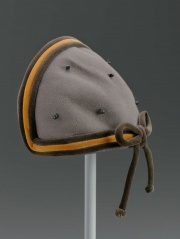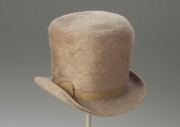Felt
Jump to navigation
Jump to search
Description
A nonwoven textile composed of matted Cotton, Wool ,or Hair fibers compressed together with heat and moisture. The oldest known fabric samples, excavated in Turkey, are made of wool felt and date to at least 6500 BCE. Felt was usually made from sheep's wool, Goat hair, or Camel hair. Occasionally vegetable fibers (e.g., Cotton, Kapok), rags, recycled paper or synthetic fibers are used for felt. Felt is a good insulator for both temperature and noise. It has been used to make hats, blankets, rugs, insulation, filtration, polishing cloths, and absorbent cloths, as well as to line boxes and instrument cases.
Synonyms and Related Terms
fur felt; wool felt; Filz (Deut.); feutre (Fr.); vilt (Ned.); fieltro (Esp.)
Resources and Citations
- M.E.Burkett, "Felt" The Dictionary of Art Vol. 10, Grove's Publishing Inc., New York, 1996.
- Fairchild's Dictionary of Textiles, Phyllis G.Tortora, Robert S. Merkel (eds.), Fairchild Publications, New York City, 7th edition, 1996
- The Dictionary of Paper, American Paper Institute, New York, Fourth Edition, 1980
- E.J.LaBarre, Dictionary and Encyclopedia of Paper and Paper-making, Swets & Zeitlinger, Amsterdam, 1969
- The Dictionary of Art, Grove's Dictionaries Inc., New York, 1996 Comment: "Felt" M.E. Burkett
- Wikipedia: http://en.wikipedia.org/wiki/Felt (Accessed Nov. 29, 2005)
- Hoechst Celanese Corporation, Dictionary of Fiber & Textile Technology (older version called Man-made Fiber and Textile Dictionary, 1965), Hoechst Celanese Corporation, Charlotte NC, 1990
- Matt Roberts, Don Etherington, Bookbinding and the Conservation of Books: a Dictionary of Descriptive Terminology, U.S. Government Printing Office, Washington DC, 1982
- Dictionary of Building Preservation, Ward Bucher, ed., John Wiley & Sons, Inc., New York City, 1996
- Edward Reich, Carlton J. Siegler, Consumer Goods: How to Know and Use Them, American Book Company, New York City, 1937
- Art and Architecture Thesaurus Online, http://www.getty.edu/research/tools/vocabulary/aat/, J. Paul Getty Trust, Los Angeles, 2000

